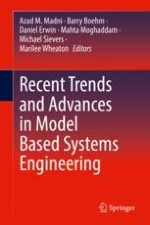2022 | OriginalPaper | Buchkapitel
Ontology-Driven Knowledge Modeling and Reasoning for Multi-domain System Architecting and Configuration
verfasst von : Leonard Petnga
Erschienen in: Recent Trends and Advances in Model Based Systems Engineering
Aktivieren Sie unsere intelligente Suche, um passende Fachinhalte oder Patente zu finden.
Wählen Sie Textabschnitte aus um mit Künstlicher Intelligenz passenden Patente zu finden. powered by
Markieren Sie Textabschnitte, um KI-gestützt weitere passende Inhalte zu finden. powered by
